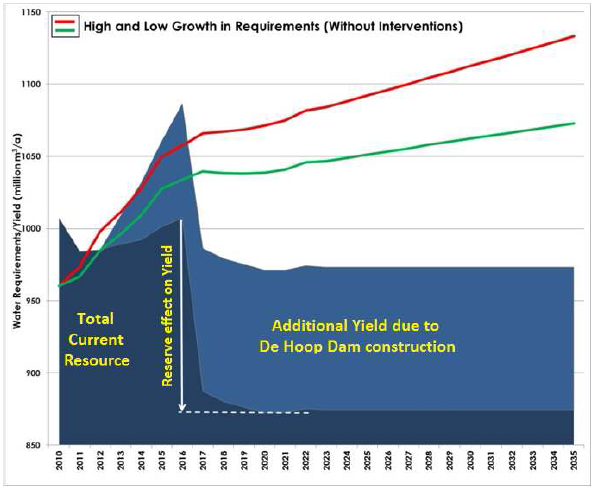Area of Supply
The Olifants River Water Supply System provides water for domestic and industrial
water use purposes, irrigation, mining and power generation. The system serves
more than 3 million people, providing domestic water to towns and rural areas
within the Olifants Catchment as well as to the towns Polokwane and Mokopane and
their surrounding rural areas northbound and outside of the catchment area.
Planning for the Olifants River Water Supply System
The Reconciliation Strategy for the Olifants River Water Supply System was
completed towards the end of 2011. The strategy had its aim to reconcile future
water requirements with supply for a 25 year planning horizon, and to provide a
framework for decision making.
Strategy Steering Committee
A Strategy Steering Committee has been established on 7 March 2013. This
committee has representatives from inter alia national departments involved in
water resource management, including the regional and national offices of DWS,
provincial departments involved in water resource management, organized
agriculture, relevant District and Local Municipalities, the Mining Sector and
ESKOM. The Strategy Steering Committee will actively monitor implementation of
the strategy by all role players.
Water requirements and availability
|
The accompanying graph shows the current system yield and the expected high and
low water requirements until 2035. The system yield include transfers of water
into the Olifants River Catchment from the Vaal , Usuthu and Komati River
Catchments totalling 228 million m3/a for the seven ESKOM power stations within
the catchment. The system yield will increase as a result of the commissioning
of the De Hoop Dam in 2012/13. The ecological Reserve for the Olifants River
Catchment has not yet been operationalized and it has been assumed that this
will be implemented when De Hoop Dam reaches its full capacity. It has been
established that the ecological Reserve will reduce the available yield by
approximately 157 million m3/a.
|
|

|
The graph shows that without implementing interventions that will either reduce
the water requirements or increase the water supply, the system will run into
water deficits just after the implementation of the ecological Reserve (2017)
Water Quality
There are some serious water quality problems in the Olifants River Catchment.
Localised water quality problems must be addressed by intensified compliance
monitoring and enforcement and by reducing pollution at source. A separate water
quality management strategy is being envisaged to address the water quality
management issues.
The water quality in the study area however does not affect the management or
availability of the resource (i.e. dilution is not required as yet). At many
monitoring stations however, there is an upward trend in pollution. To ensure
the sustainability of the resource, immediate attention must be given to the
upward trend in pollution.
Supply interventions to meet future needs
The following interventions are necessary to overcome the expected water deficit
from 2017:
Successful implementation of interventions
DWS, as trustee of the country’s water resources, is only facilitating the
process of water reconciliation planning and the implementation of the
interventions is the responsibility of many more institutions. Without a
concerted effort by all role players, water reconciliation cannot be achieved
over the forthcoming years and it is therefore imperative that all relevant
institutions work closely together.
|